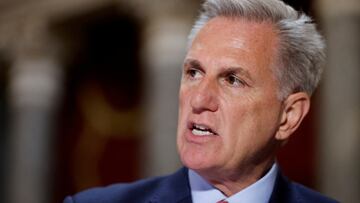How could the debt ceiling deal affect Biden’s student loan forgiveness plan?
Congress is getting ready to vote on the debt ceiling agreement between GOP leaders and the White House. What does the bill say about student debt forgiveness?


Like much of the agreement reached between the White House and Congressional Republicans over the debt ceiling, the terms related to student cancellation are much less significant than what GOP leaders are trying to tell their caucus.
No direct effect on President Biden’s cancellation program
The agreement to raise the debt ceiling will not impact the cancellation of up to $20,000 in student loans for over forty million borrowers. The only body that will be able to impact whether or not the program goes into effect is the Supreme Court.
The Republican-controlled House of Representatives has passed various laws and resolutions that would undo the student loan cancellation policy enacted by President Biden through executive order, the legality of which is currently under review by the Supreme Court. A decision from the courts is expected in June.
No more extensions...
However, the current agreement forbids President Biden from further enacting any further extensions to the student loan moratorium that has been in place since March 2020. President Biden had already informed borrowers that regardless of what the Supreme Court decides, payments for any remaining balances will kick back in later this summer. Really, this is a small win for Republicans because they were just able to get in writing what the president has said publically.
The failure of GOP leadership to secure these and other spending cuts has created a riff in the party between those who will and will not vote to increase the country’s debt limit. Representative Andy Biggs (R-AZ) accused the Biden adminstration and the Speaker of the House, Kevin McCarthy (R-CA) of delaying the announcement of the agreement to force it through Congress.
I now suspect that House GOP Leadership, the Biden White House, and the Congressional Budget Office (CBO) coordinated together to falsely advertise the McCarthy-Biden plan to the American people.
— Rep Andy Biggs (@RepAndyBiggsAZ) May 30, 2023
Here's how: pic.twitter.com/YgV1hsg5ae
Are the votes there?
The bill needs 218 votes to pass.
Republicans hold 224 seats.
The president has made clear that some Democrats will be able to support the bill to help it get over the finish line since even Speaker McCarthy expects to lose more than four votes. Nevertheless, there is no clear idea of how many Republicans are unwilling to support the bill or how many Democrats would approve it in its current form. This leaves the White House and Speaker McCarthy in a delicate situation, where we could see so many defections from the far right of the Republican party that Democrats are able to remove some of what they see as controversial spending cuts or caps the current agreement imposes.
Related stories
Rep. Vern Buchanan (R-FL) has said he is voting no. As has Rep. Lauren Boebert (R-CO), Rep. Matt Gaetz (R-FL), and Rep. Diana Harshbarger (R-TN) have also said they oppose the bill that is currently floating around Capitol Hill. These four members plus Rep. Biggs mean that at least one Democratic vote would be needed to raise the debt ceiling.
Proud to join @RepKenBuck, @RepAndyBiggsAZ, and @RepTimBurchett as the only Republicans in Congress who have never voted to raise the Debt Limit for this woke and weaponized government.
— Rep. Matt Gaetz (@RepMattGaetz) May 30, 2023
Hakeem Jefferies, the current House Minority Leader, said that the agreement was still under review, and he did not have a gauge on how many would be willing to support it as of Tuesday morning.

